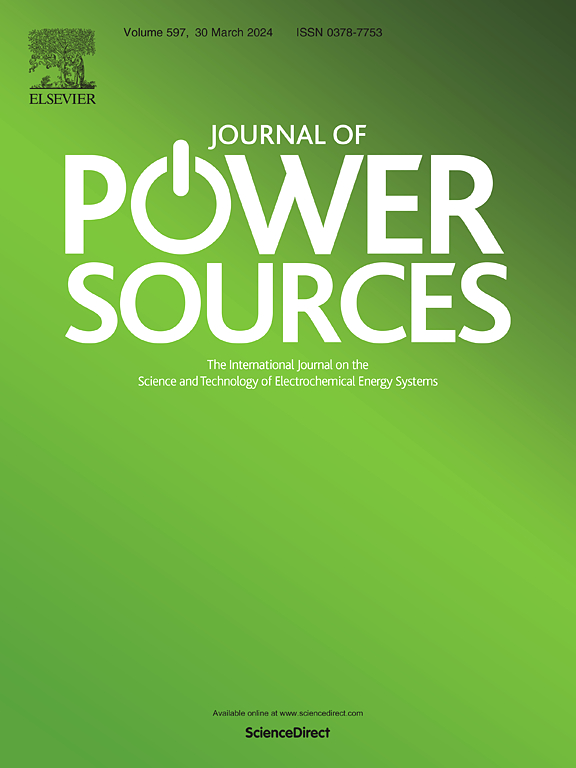从理论到运行:燃料电池系统的系统损耗分析框架
IF 7.9
2区 工程技术
Q1 CHEMISTRY, PHYSICAL
引用次数: 0
摘要
本出版物提出了一个系统的和广泛适用的方法来分析燃料电池系统的效率损失,跟踪性能从理论到实际(有效)效率。效率损失的分类是根据燃料电池系统中的物理和化学来源进行的,包括DC/DC转换器作为定义的系统边界。该方法描述了不同的损耗类别,包括由熵产生、偏离标准操作条件、内部电流密度、电化学激活过电位、膜相关损耗、欧姆电阻、气体传输限制以及由于净化事件和辅助组件(如植物平衡系统)引起的损耗。这种结构化的方法既有助于定量评估个体损失贡献,也有助于确定不同损失机制之间的相互作用,从而实现有针对性的系统优化。虽然该方法普遍适用于各种燃料电池技术,但目前的工作是使用质子交换膜(PEM)燃料电池系统在寿命开始和退化工作状态下进行评估。结果突出了运行参数和退化现象对系统性能的影响。此外,对效率改进潜力的分析揭示了提高PEM燃料电池系统整体性能的大量机会。本文章由计算机程序翻译,如有差异,请以英文原文为准。
From theory to operation: A systematic loss analysis framework for fuel cell systems
This publication presents a systematic and broadly applicable methodology for analyzing efficiency losses in fuel cell systems, tracing performance from theoretical to actual (effective) efficiency. The classification of efficiency losses is conducted according to their physical and chemical origins within fuel cell systems, encompassing the DC/DC converter as the defined system boundary. The methodology delineates distinct loss categories, including those arising from entropy generation, deviations from standard operating conditions, internal current density, electrochemical activation overpotentials, membrane-associated losses, ohmic resistance, gas transport limitations, and losses due to purging events and auxiliary components (such as balance-of-plant systems). This structured approach facilitates both the quantitative assessment of individual loss contributions and the identification of interactions among different loss mechanisms, thereby enabling targeted system optimization. While the methodology is universally applicable to various fuel cell technologies, the current work exemplifies its implementation using a proton exchange membrane (PEM) fuel cell system evaluated under beginning-of-life and degraded operating states. The results highlight the influence of operational parameters and degradation phenomena on system performance. Additionally, an analysis of efficiency improvement potential reveals substantial opportunities for enhancing the overall performance of PEM fuel cell systems.
求助全文
通过发布文献求助,成功后即可免费获取论文全文。
去求助
来源期刊

Journal of Power Sources
工程技术-电化学
CiteScore
16.40
自引率
6.50%
发文量
1249
审稿时长
36 days
期刊介绍:
The Journal of Power Sources is a publication catering to researchers and technologists interested in various aspects of the science, technology, and applications of electrochemical power sources. It covers original research and reviews on primary and secondary batteries, fuel cells, supercapacitors, and photo-electrochemical cells.
Topics considered include the research, development and applications of nanomaterials and novel componentry for these devices. Examples of applications of these electrochemical power sources include:
• Portable electronics
• Electric and Hybrid Electric Vehicles
• Uninterruptible Power Supply (UPS) systems
• Storage of renewable energy
• Satellites and deep space probes
• Boats and ships, drones and aircrafts
• Wearable energy storage systems
 求助内容:
求助内容: 应助结果提醒方式:
应助结果提醒方式:


